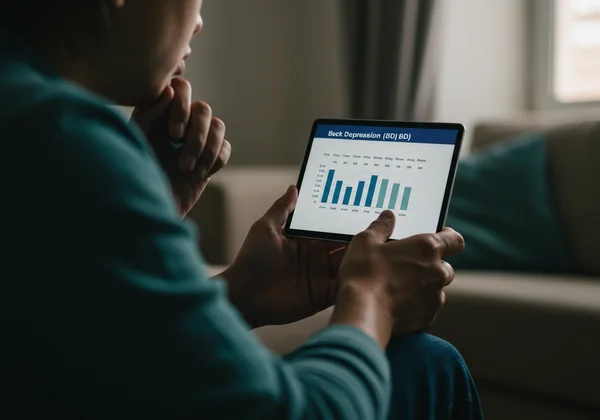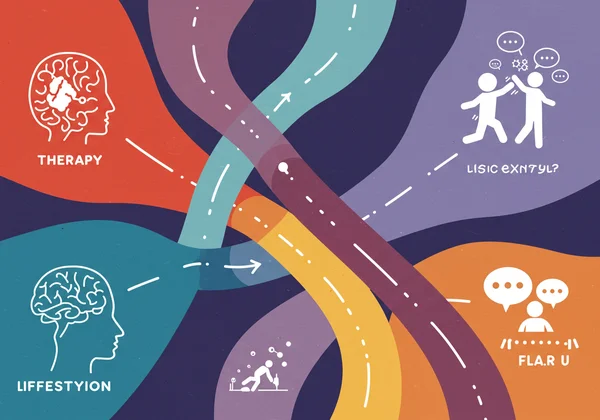Understanding Your High BDI Test Score: How to Talk to Your Doctor About Depression
September 29, 2025 | By Beatrice Holloway
Receiving a concerning score on a Beck Depression Inventory (BDI) test can feel unsettling, but it's also a powerful first step toward clarity. You've taken a moment to check in with yourself, and that insight is invaluable. The key now is to use this information productively. Many people wonder, what is the BDI test for if not a diagnosis? It's a scientifically validated tool designed to help you and your healthcare provider understand your mood and symptoms. This guide provides a clear, empowering roadmap for discussing your BDI results and mental health with a doctor, turning your self-assessment into a constructive conversation.
Taking a free BDI test is an act of self-awareness. Now, let's prepare you for the next step with confidence.

Preparing for Your Doctor Appointment After a High BDI Score
A little preparation can transform your doctor's visit from a source of anxiety into a productive partnership. Walking in with organized thoughts and information helps ensure you cover all your concerns and get the most out of your time. This is a crucial part of the process after you talk to your doctor about depression.
Understanding What Your BDI Score Means
First, let's put your score in context. The BDI is a screening tool, not a diagnostic one. It measures the severity of depressive symptoms based on your self-reported feelings over the past week. A high score suggests that you are experiencing a significant number of symptoms associated with depression. Think of it as a well-organized summary of your emotional state. It provides a starting point for discussion, giving your doctor a snapshot of what you're going through. It doesn’t define you, but it does help articulate your experience.
Documenting Your Symptoms and Feelings
Your BDI score is the headline; your daily experiences are the story. To help your doctor understand the full picture, spend some time before your appointment documenting your symptoms. Go beyond the 21 questions of the BDI. Consider these areas:
- Duration: How long have you been feeling this way? Days, weeks, or months?
- Triggers: Are there specific situations, times of day, or events that make you feel worse?
- Impact on Daily Life: How are these feelings affecting your work, relationships, sleep, appetite, or hobbies?
- Physical Symptoms: Note any changes like fatigue, headaches, digestive issues, or unexplained aches and pains.
- Coping Mechanisms: What have you been doing to try and feel better? Has anything helped, even a little?
Jotting this down in a notebook or on your phone can be incredibly helpful when you’re in the doctor’s office and feeling nervous.

Key Questions to Ask Your Healthcare Provider
Walking into an appointment with questions prepared empowers you to be an active participant in your own care. It shows you are engaged and helps you leave with the information you need. Here are some key questions to consider asking:
- Based on my BDI score and the symptoms I've described, what are your thoughts?
- Could there be any other medical conditions causing these symptoms?
- What are the different treatment options available for what I'm experiencing?
- What are the pros and cons of potential treatments, like therapy or medication?
- Can you refer me to a mental health specialist, such as a therapist or psychiatrist?
- What lifestyle changes (e.g., exercise, diet, sleep) might help support my well-being?
- When should we schedule a follow-up appointment to check on my progress?
Discussing Your BDI Test Results with Your Doctor
The conversation itself can be the most intimidating part, but remember that doctors are trained professionals who discuss sensitive health topics every day. Your emotional health is just as important as your physical health, and initiating this conversation is a sign of strength. This is the core of discussing mental health with your doctor.
Initiating the Conversation About Your Mental Health
Finding the right words to begin can be tough. You don't need a perfect opening line. Be direct and clear. Here are a few simple ways to start:
- "I've been feeling down lately and wanted to talk to you about it."
- "I'm here today because I'm concerned about my mental health."
- "I recently took an online Beck Depression Inventory test and the results concerned me. I'd like to discuss them with you."
Bringing up the mood self-assessment tool you used can be a great, fact-based way to open the door to a more personal conversation.

Effectively Communicating Your Symptoms and Experiences
This is where your notes will come in handy. Refer to them as you talk. Be as honest and detailed as you can. Don't downplay your feelings or worry about being judged. Use "I" statements to describe your personal experience, such as "I've been having trouble sleeping" or "I've lost interest in things I used to enjoy." The more specific you are, the better your doctor can understand your situation and rule out other potential causes for your symptoms.
Sharing Your BDI Score for Comprehensive Insight
Present your BDI score as a piece of data that prompted you to seek help. You can say something like, "I took this free online BDI test, and my score was [your score], which falls into the moderate/severe range. This result reflects how I've been feeling." This gives the doctor a validated framework to understand the severity of your symptoms. It transforms abstract feelings into a more concrete metric, making it a valuable part of a comprehensive assessment and helping to [interpret BDI-II scores] in a clinical context.
Understanding Your Next Steps After Talking to Your Doctor
The initial conversation is the beginning of a journey. After discussing your concerns, your doctor will work with you to create a plan. Understanding what to do after a depression test and a doctor's visit is essential for moving forward with a sense of direction and hope.
Exploring Potential Treatment Pathways and Support
Based on your conversation, your doctor may suggest several paths. These are not mutually exclusive and are often combined for the best results:
-
Therapy/Counseling: Talking with a licensed therapist can help you develop coping strategies, understand thought patterns, and work through underlying issues.
-
Medication: Antidepressants may be recommended to help balance brain chemistry and alleviate symptoms.
-
Lifestyle Adjustments: Your doctor will likely discuss the significant impact of regular exercise, a balanced diet, consistent sleep, and stress management techniques.
-
Further Testing: They may order blood tests to rule out physical conditions (like thyroid issues or vitamin deficiencies) that can mimic symptoms of depression.

Seeking Referrals for Specialized Mental Health Care
While your primary care physician is an excellent starting point, they may refer you to a specialist for more focused care. This is a positive step. A psychiatrist can manage medication with specialized expertise, while a psychologist or therapist can provide in-depth talk therapy. This referral ensures you receive care from someone whose entire focus is on mental wellness.
Planning for Follow-Up and Ongoing Well-being
Managing your mental health is an ongoing process. Your doctor will schedule a follow-up appointment to see how you are responding to the initial treatment plan. This is your opportunity to discuss what’s working, what isn’t, and make any necessary adjustments. Be patient with yourself and the process. Finding the right combination of support takes time, and consistent follow-up is key to long-term well-being. Using the online BDI tool periodically can also be a helpful way to track your symptoms over time and discuss trends with your provider.
Taking Proactive Steps Towards Your Mental Well-being
Receiving a high BDI score can be a turning point. It's the moment you move from uncertainty to action. By preparing for your appointment, communicating openly, and working with your doctor on a plan, you are taking charge of your mental health. This journey requires courage, and the step you've already taken by seeking information is a testament to your strength.
Remember that a test score is just one piece of information. The most important part is the conversation it starts. If you're ready to gain more insight or want a baseline before your next appointment, you can always get your score with our confidential and validated tool.
Frequently Asked Questions About BDI Scores & Doctor Visits
What does a high BDI score indicate?
A high BDI score indicates that you are currently experiencing a significant number of symptoms commonly associated with depression, such as sadness, loss of pleasure, and changes in sleep or appetite. It measures the severity of these symptoms but is not a diagnosis. It's a flag that suggests a conversation with a healthcare professional is a good next step.
Is the BDI test a diagnosis for depression?
No, absolutely not. The BDI test is a highly respected and scientifically validated screening tool, but it cannot provide a clinical diagnosis. A formal diagnosis of depression can only be made by a qualified healthcare professional (like a doctor, psychiatrist, or psychologist) after a comprehensive evaluation of your symptoms, medical history, and personal circumstances.
What should I do if I can't get a doctor's appointment soon?
If there's a long wait for an appointment, don't lose momentum. Use the time to continue documenting your symptoms in detail. Focus on self-care basics: try to get gentle exercise, eat nourishing meals, and maintain a regular sleep schedule. You can also look into mental health resources like support groups or confidential warm-lines in your area. If you are in crisis, please contact an emergency service or crisis hotline immediately.
Can my doctor dismiss my BDI results?
A good healthcare provider will take your concerns seriously, including the results from a tool like the BDI. They may not base their entire assessment on it, but they should see it as a valuable, structured summary of your experiences that prompted you to seek help. If you feel dismissed, remember that you have the right to a second opinion from another doctor.
What's the difference between a BDI test and a clinical diagnosis?
Think of the BDI test as a snapshot and a clinical diagnosis as the full documentary. The BDI provides a score based on a standardized 21-question survey you complete yourself. A clinical diagnosis is a much broader process where a professional talks with you in-depth, assesses how your symptoms impact your life, considers your full health history, and uses established diagnostic criteria (like the DSM-5) to make a formal determination. Taking the first step to understand your results is a great way to prepare for that deeper conversation.